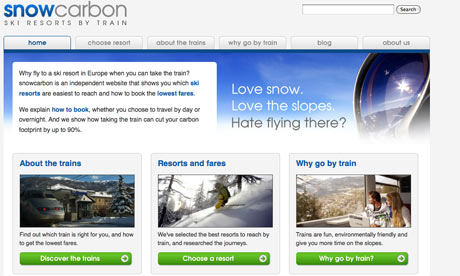
A new website launched today promises to lure skiers and snowboarders off planes and on to trains. Snowcarbon lists 30 of the most convenient European resorts to reach by train and provides step-by-step guides to timetables, transfers and booking.
The site also features warts and all resort guides written by specialist ski journalists, as well as comparison information on the carbon footprint of reaching each resort by rail and air.
"So many skiers and boarders would rather travel to resorts by train," says Snowcarbon founder Daniel Elkan, "but few realise how many resorts are convenient by rail, or know how to reach them. Until now, finding this information has been difficult, like fitting pieces of a puzzle together."
Only 6% of journeys to European ski resorts last winter season were made by rail, up from 5% in 2007-8, according to Ski Club of Great Britain research. The vast majority of last season's journeys - 72% - were still by air in winter 2008-9.
However dozens of Alpine resorts are under threat if predictions of global warming's impact on the snow line prove accurate. A report from the OECD in 2006 found that just a two-degree rise in temperature in the Alps, which could occur by 2050, would reduce the number of viable ski slopes in the region from 666 to 400.
"Travelling to a ski resort by train is proven to reduce skiers' carbon footprints and Snowcarbon will help people plan their journey by train more easily," said Betony Garner of The Ski Club of Great Britain, which runs its own environmental campaign, Respect the Mountain.
Snowcarbon is working with Best Foot Forward to show how far travellers can cut their carbon emissions by switching to rail. A one-way journey to the French resort of Chamonix, for example, generates 10.81kg of CO2 per person by train, 79.01kg per person by plane and 206.67 kg per car.
Set up by Elkan and fellow freelance journalist Mark Hodson, Snowcarbon is independent but has worked closely with Eurostar, Rail Europe and Deutsche Bahn, to offer simpler online booking forms for travel to featured resorts. Tourist boards and ski resorts provided some initial funding and rail operators will pay Snowcarbon a commission on each completed booking, at no extra cost to travellers.
"It's something I'm passionate about, but because it's so research intensive – it's taken me a year nearly full time. I've got into debt doing it, I've even slept rough in a Basel doorway researching it!" says Elkan, who has visited over 50 resorts by train.
"I know when there's a lift to the platform, where you can kill a half hour waiting for a connection at a nearby cafe. Snowcarbon can also be an insider's guide and help people enjoy their journeys more."
Historic obstacles to a major take-up of rail routes have been the lack of integrated booking systems between the major rail operators and concern among travellers about long, complicated journeys with little information on transfers and additional costs.
"Information about transfers is crucial," according to Elkan. "If you don't know how far the station is to the resort or how much a taxi will cost, you are not going to try it. Also, the name of a station is often not the same as the resort so we give guidance on that."
This winter sees the added challenge of a halt in the operation of Rail Europe's direct Snow Train service to the Tarentaise ski area, serving Tignes, Meribel, Val Thorens, Les Menuires and Courchevel.
"The big problem for low-carbon skiing is Rail Europe's Snow Train being discontinued this winter, due to poor exchange rates and high costs charged by SNCF," commented Mark Smith, founder of award-winning rail information website The Man in Seat 61. "This leaves only Eurostar ski trains or scheduled trains with the need to change in Paris. We need more trains to the snow."
Despite this, Elkan believes there are enough other options to make taking the train to the Alps a viable alternative to flying, and that the situation will improve.
"Things will become more integrated because rail companies will become more integrated, they have just been slow. The future is also with tour operators because they can organise transfers from the nearest station and rail travel included in their packages."
"Once we are up and running, the most useful thing we can do for skiers, boarders, resorts and the environment is to be a catalyst for making the journeys even better."

